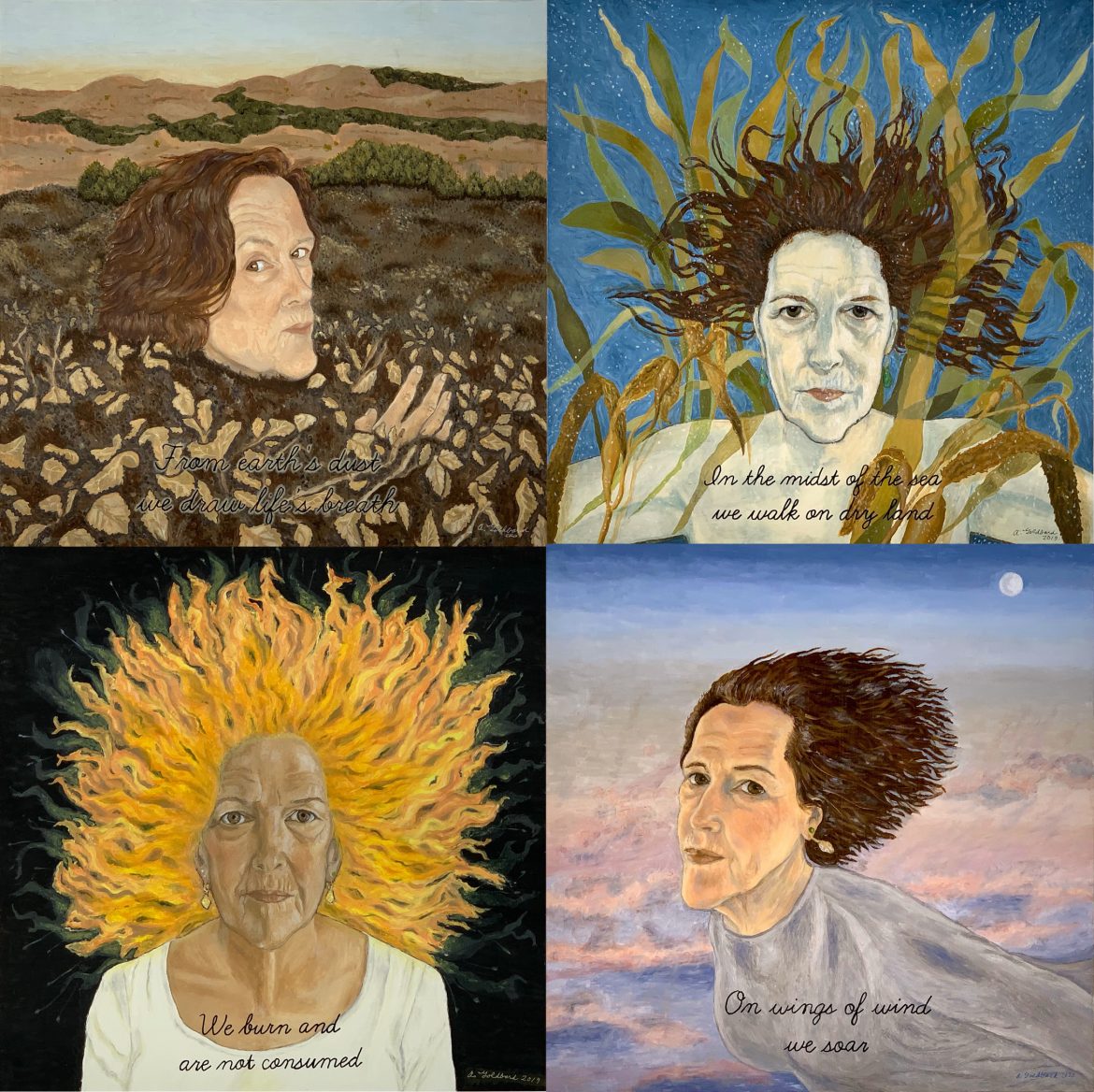What can console us in the face of the Great Unknown? I thought I understood that safety was always an illusion: any of us could be struck down at any moment. But having the illusion of safety erased, that’s uncertainty of another magnitude, so vastly out of proportion to the “normal,” default reality that words can’t do it justice.
When I painted the first of these self-portraits in August—the one with my hair on fire—I had no idea it would add up to something much larger and more urgent, compelling me to share with you. I soon had the idea of depicting the remaining three elements: water, earth, and air. I knew that my own face could stand in for the weathered face of Mother Earth. I knew there would be a stark contrast in each painting between the aging face and the wild energy of the element supporting it; between the lines and shadows and the relentless gaze. A few weeks before the pandemic began to make headlines, the texts written on the lower edge of each painting came to me.
But I didn’t know till this week that something beyond my own hands had painted these pictures: the voices of Gaia and Shekhina.
In Greek mythology, Gaia is the feminine embodiment of life, the personification of Planet Earth. Her name has come to be central to ecological thinking since James Lovelock’s 1979 book, Gaia: A New Look at Life on Earth. It introduced “the Gaia hypothesis,” asserting that all that exists on this planet is part of a complex dynamic system that sustains life on earth, that intervening in one part of that system inevitably affects the whole.
In Jewish spirituality, Shekhina is the imminent Divine Presence, the feminine aspect of the Divine. Because the ancient sacred texts are sorely lacking in direct address of the role of women in making and upholding the world as a holy vessel for life, in recent decades, Jewish teachers, especially women, have created new liturgy, practices, and understandings to right this omission as a path to healing the world.
I am not a Pollyanna. I have no more idea than anyone what this plague will bring: my inbox, like yours, is overflowing with best and worst-case scenarios, and like you, I will have to do my best to help while I wait and see which comes true.
I see this plague unmasking the terrible inequities of the modern world, in which the privileged bask in their advantages while the marginalized bear the brunt, in which a giant deranged baby rules in the White House. Whether he is merely blind to others’ suffering or basking in it, I cannot say, but he seems determined to say and do the precisely worst thing at every turn, the thing that multiplies harm. So many people are responding to this moment with compassion and generosity, even as some public officials and private corporations rush to profit from suffering, finding infinite ways to rationalize their greed. I am fearful, hopeful, obsessed, distracted, and each of these swirls into the next without a pause.
Yet the message brought to me by Gaia and Shekhina is this: while green life springs from the dust and birds course through the spring air, life abides. The spirit that sustained us to meet this moment can carry us into the next, if only we listen. I am choosing to listen.
Yesterday an essay by Rabbi Tirzah Firestone came my way: “The Sacred Meaning of COVID-19.” It arrived just as I was thinking how to share these paintings, the best way to offer these images as a gift. She wrote this:
What if we understood KOVID-19—this horrific virulent virus (our ancestors would surely call it a plague)—as Shechinah’s formidable face showing up today to admonish us, correct us, love us back into our rightful place as creatures, not masters, of this earth?
“Shechinah’s formidable face” is what I have tried to depict. If you find this image useful and want to share it for some noncommercial purpose, please contact me. You can also see it and more of my paintings at my website.
May you be blessed with health and well-being, with ears to hear the voices of Gaia and Shekhina, with eyes to see both the suffering of the world and its beauty, with voice to speak out when needed, to comfort and console.
“Mother Earth” by Tracy Nelson.
